Taxation Law Assignment: Bruce Lee's Tax Liability Calculation
VerifiedAdded on 2023/06/08
|12
|2700
|303
Homework Assignment
AI Summary
This assignment provides a comprehensive analysis of Bruce Lee's tax liability for the year ended June 30, 2018, as a lawyer with his own legal practice. The assignment meticulously examines various sources of income, including professional legal fees, rental income, dividends, and interest, determining their assessability under the ITAA 1997. It also details the calculation of taxable income, considering allowable deductions such as office rent, salary payments, and tax agent fees. The assignment also covers specific tax implications related to capital gains from the sale of office equipment, and the treatment of expenses related to his investment property, like rates and interest payments, as well as the impact of carry-forward losses and franking credits. The solution provides a detailed computation of tax liability, culminating in the calculation of total tax payable, offering a practical application of taxation law principles.
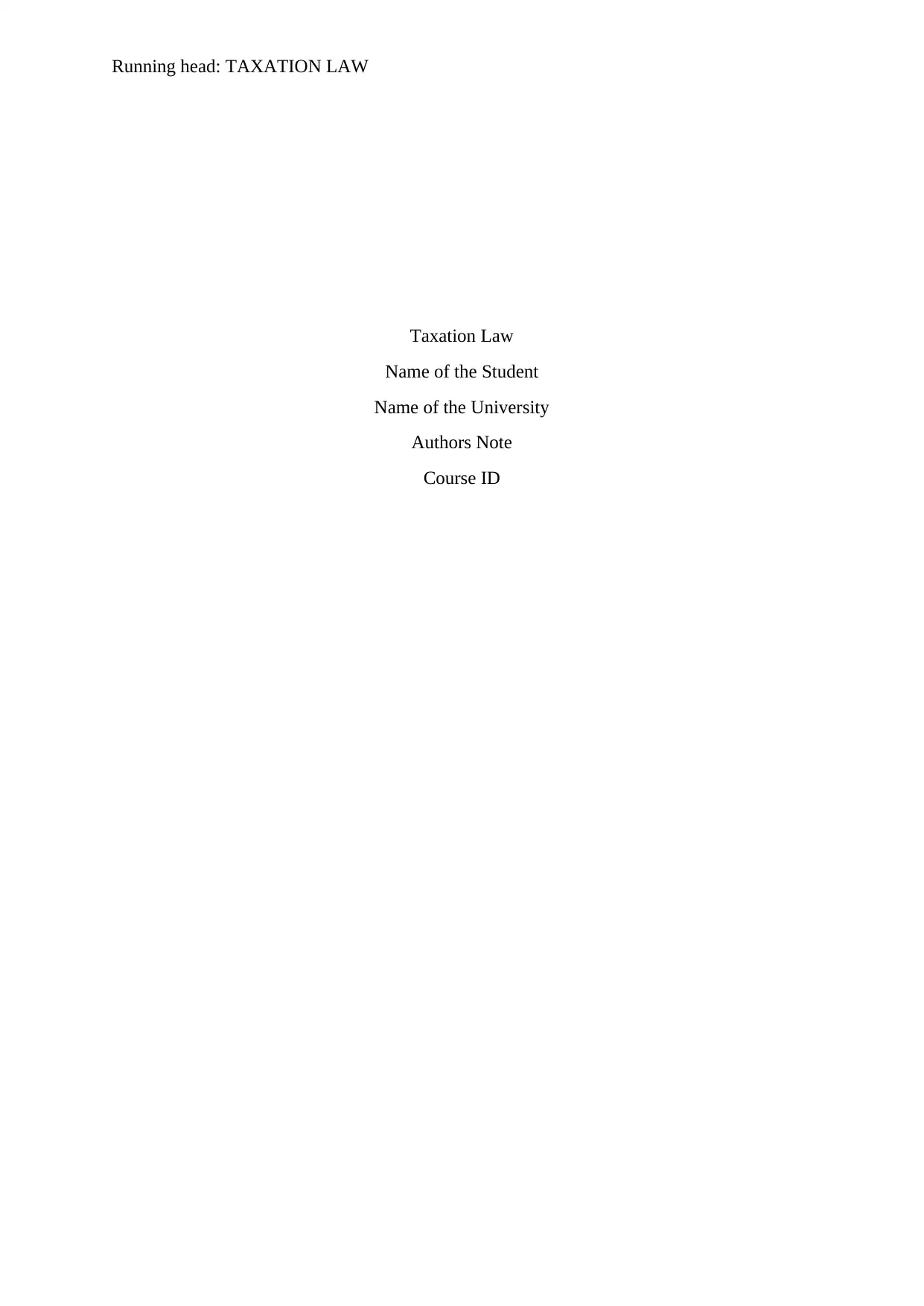
Running head: TAXATION LAW
Taxation Law
Name of the Student
Name of the University
Authors Note
Course ID
Taxation Law
Name of the Student
Name of the University
Authors Note
Course ID
Paraphrase This Document
Need a fresh take? Get an instant paraphrase of this document with our AI Paraphraser
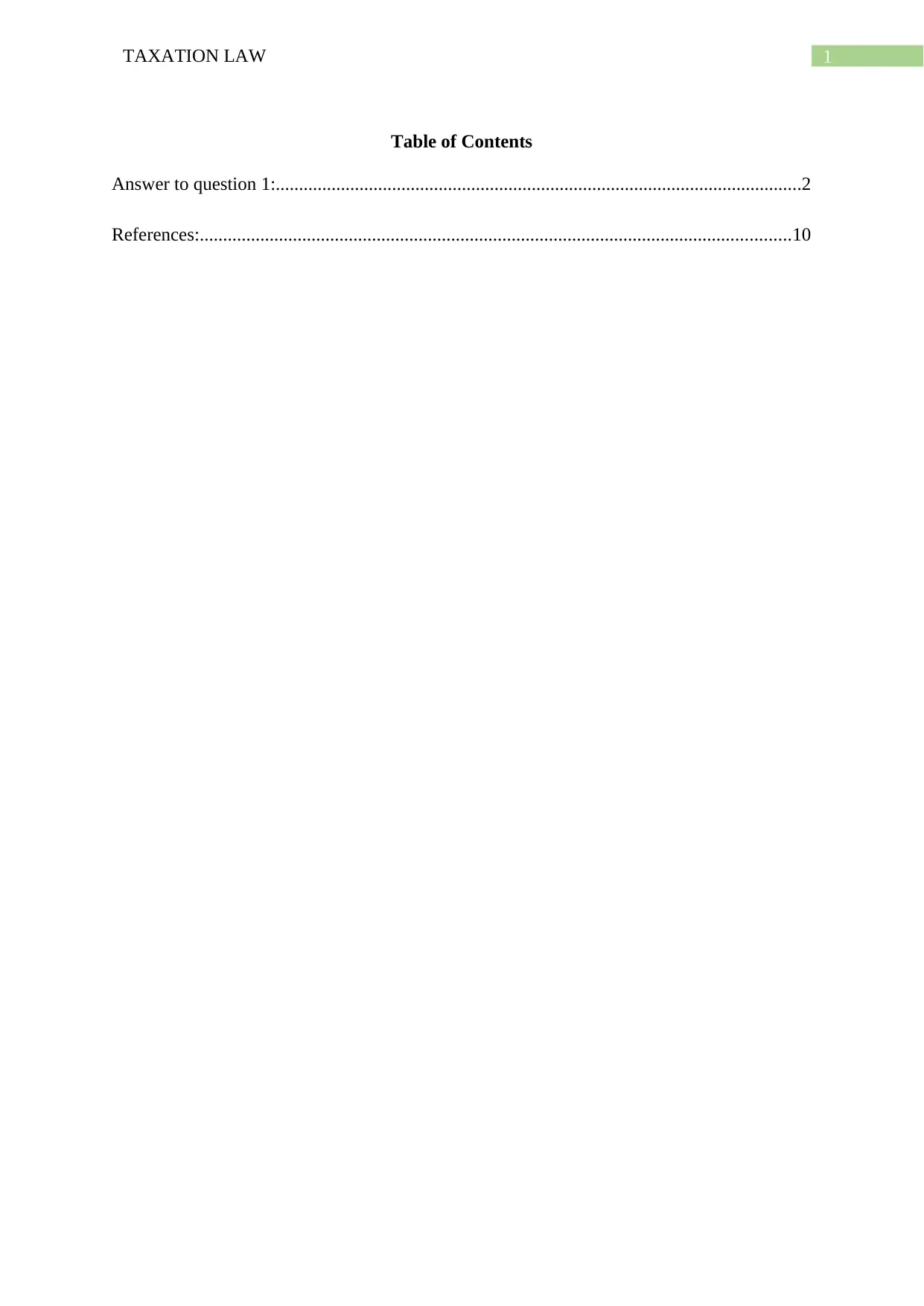
1TAXATION LAW
Table of Contents
Answer to question 1:.................................................................................................................2
References:...............................................................................................................................10
Table of Contents
Answer to question 1:.................................................................................................................2
References:...............................................................................................................................10
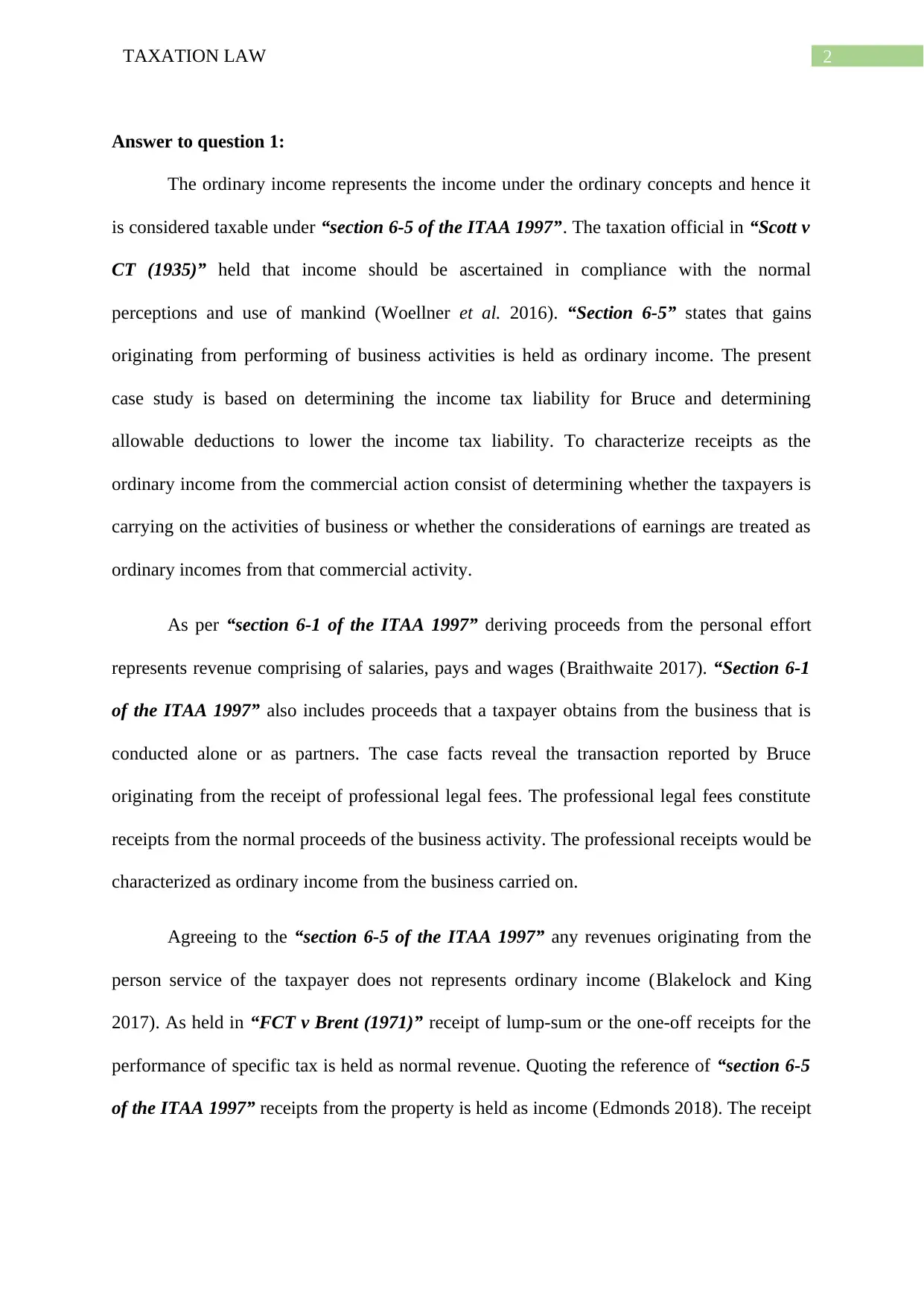
2TAXATION LAW
Answer to question 1:
The ordinary income represents the income under the ordinary concepts and hence it
is considered taxable under “section 6-5 of the ITAA 1997”. The taxation official in “Scott v
CT (1935)” held that income should be ascertained in compliance with the normal
perceptions and use of mankind (Woellner et al. 2016). “Section 6-5” states that gains
originating from performing of business activities is held as ordinary income. The present
case study is based on determining the income tax liability for Bruce and determining
allowable deductions to lower the income tax liability. To characterize receipts as the
ordinary income from the commercial action consist of determining whether the taxpayers is
carrying on the activities of business or whether the considerations of earnings are treated as
ordinary incomes from that commercial activity.
As per “section 6-1 of the ITAA 1997” deriving proceeds from the personal effort
represents revenue comprising of salaries, pays and wages (Braithwaite 2017). “Section 6-1
of the ITAA 1997” also includes proceeds that a taxpayer obtains from the business that is
conducted alone or as partners. The case facts reveal the transaction reported by Bruce
originating from the receipt of professional legal fees. The professional legal fees constitute
receipts from the normal proceeds of the business activity. The professional receipts would be
characterized as ordinary income from the business carried on.
Agreeing to the “section 6-5 of the ITAA 1997” any revenues originating from the
person service of the taxpayer does not represents ordinary income (Blakelock and King
2017). As held in “FCT v Brent (1971)” receipt of lump-sum or the one-off receipts for the
performance of specific tax is held as normal revenue. Quoting the reference of “section 6-5
of the ITAA 1997” receipts from the property is held as income (Edmonds 2018). The receipt
Answer to question 1:
The ordinary income represents the income under the ordinary concepts and hence it
is considered taxable under “section 6-5 of the ITAA 1997”. The taxation official in “Scott v
CT (1935)” held that income should be ascertained in compliance with the normal
perceptions and use of mankind (Woellner et al. 2016). “Section 6-5” states that gains
originating from performing of business activities is held as ordinary income. The present
case study is based on determining the income tax liability for Bruce and determining
allowable deductions to lower the income tax liability. To characterize receipts as the
ordinary income from the commercial action consist of determining whether the taxpayers is
carrying on the activities of business or whether the considerations of earnings are treated as
ordinary incomes from that commercial activity.
As per “section 6-1 of the ITAA 1997” deriving proceeds from the personal effort
represents revenue comprising of salaries, pays and wages (Braithwaite 2017). “Section 6-1
of the ITAA 1997” also includes proceeds that a taxpayer obtains from the business that is
conducted alone or as partners. The case facts reveal the transaction reported by Bruce
originating from the receipt of professional legal fees. The professional legal fees constitute
receipts from the normal proceeds of the business activity. The professional receipts would be
characterized as ordinary income from the business carried on.
Agreeing to the “section 6-5 of the ITAA 1997” any revenues originating from the
person service of the taxpayer does not represents ordinary income (Blakelock and King
2017). As held in “FCT v Brent (1971)” receipt of lump-sum or the one-off receipts for the
performance of specific tax is held as normal revenue. Quoting the reference of “section 6-5
of the ITAA 1997” receipts from the property is held as income (Edmonds 2018). The receipt
⊘ This is a preview!⊘
Do you want full access?
Subscribe today to unlock all pages.

Trusted by 1+ million students worldwide
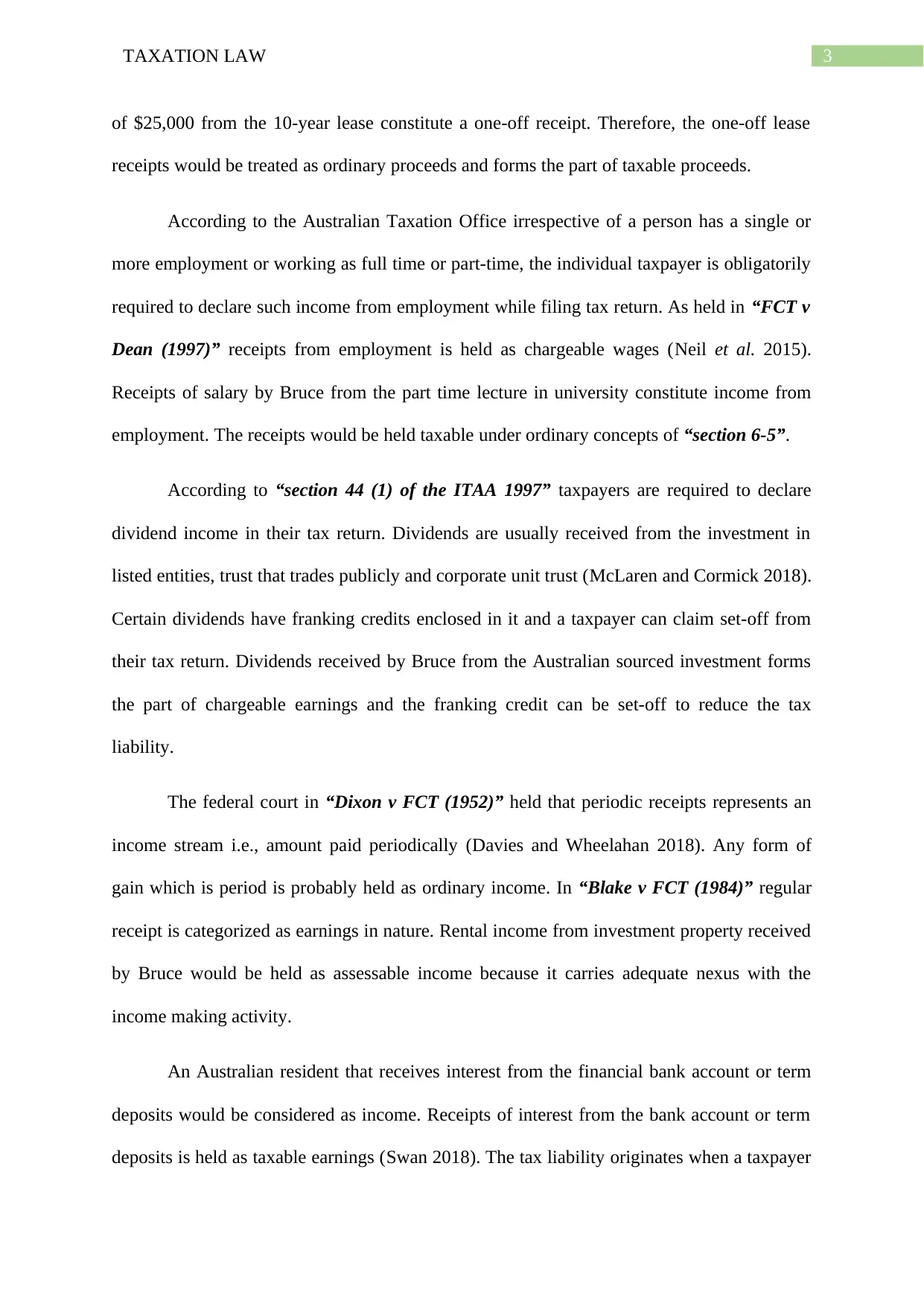
3TAXATION LAW
of $25,000 from the 10-year lease constitute a one-off receipt. Therefore, the one-off lease
receipts would be treated as ordinary proceeds and forms the part of taxable proceeds.
According to the Australian Taxation Office irrespective of a person has a single or
more employment or working as full time or part-time, the individual taxpayer is obligatorily
required to declare such income from employment while filing tax return. As held in “FCT v
Dean (1997)” receipts from employment is held as chargeable wages (Neil et al. 2015).
Receipts of salary by Bruce from the part time lecture in university constitute income from
employment. The receipts would be held taxable under ordinary concepts of “section 6-5”.
According to “section 44 (1) of the ITAA 1997” taxpayers are required to declare
dividend income in their tax return. Dividends are usually received from the investment in
listed entities, trust that trades publicly and corporate unit trust (McLaren and Cormick 2018).
Certain dividends have franking credits enclosed in it and a taxpayer can claim set-off from
their tax return. Dividends received by Bruce from the Australian sourced investment forms
the part of chargeable earnings and the franking credit can be set-off to reduce the tax
liability.
The federal court in “Dixon v FCT (1952)” held that periodic receipts represents an
income stream i.e., amount paid periodically (Davies and Wheelahan 2018). Any form of
gain which is period is probably held as ordinary income. In “Blake v FCT (1984)” regular
receipt is categorized as earnings in nature. Rental income from investment property received
by Bruce would be held as assessable income because it carries adequate nexus with the
income making activity.
An Australian resident that receives interest from the financial bank account or term
deposits would be considered as income. Receipts of interest from the bank account or term
deposits is held as taxable earnings (Swan 2018). The tax liability originates when a taxpayer
of $25,000 from the 10-year lease constitute a one-off receipt. Therefore, the one-off lease
receipts would be treated as ordinary proceeds and forms the part of taxable proceeds.
According to the Australian Taxation Office irrespective of a person has a single or
more employment or working as full time or part-time, the individual taxpayer is obligatorily
required to declare such income from employment while filing tax return. As held in “FCT v
Dean (1997)” receipts from employment is held as chargeable wages (Neil et al. 2015).
Receipts of salary by Bruce from the part time lecture in university constitute income from
employment. The receipts would be held taxable under ordinary concepts of “section 6-5”.
According to “section 44 (1) of the ITAA 1997” taxpayers are required to declare
dividend income in their tax return. Dividends are usually received from the investment in
listed entities, trust that trades publicly and corporate unit trust (McLaren and Cormick 2018).
Certain dividends have franking credits enclosed in it and a taxpayer can claim set-off from
their tax return. Dividends received by Bruce from the Australian sourced investment forms
the part of chargeable earnings and the franking credit can be set-off to reduce the tax
liability.
The federal court in “Dixon v FCT (1952)” held that periodic receipts represents an
income stream i.e., amount paid periodically (Davies and Wheelahan 2018). Any form of
gain which is period is probably held as ordinary income. In “Blake v FCT (1984)” regular
receipt is categorized as earnings in nature. Rental income from investment property received
by Bruce would be held as assessable income because it carries adequate nexus with the
income making activity.
An Australian resident that receives interest from the financial bank account or term
deposits would be considered as income. Receipts of interest from the bank account or term
deposits is held as taxable earnings (Swan 2018). The tax liability originates when a taxpayer
Paraphrase This Document
Need a fresh take? Get an instant paraphrase of this document with our AI Paraphraser
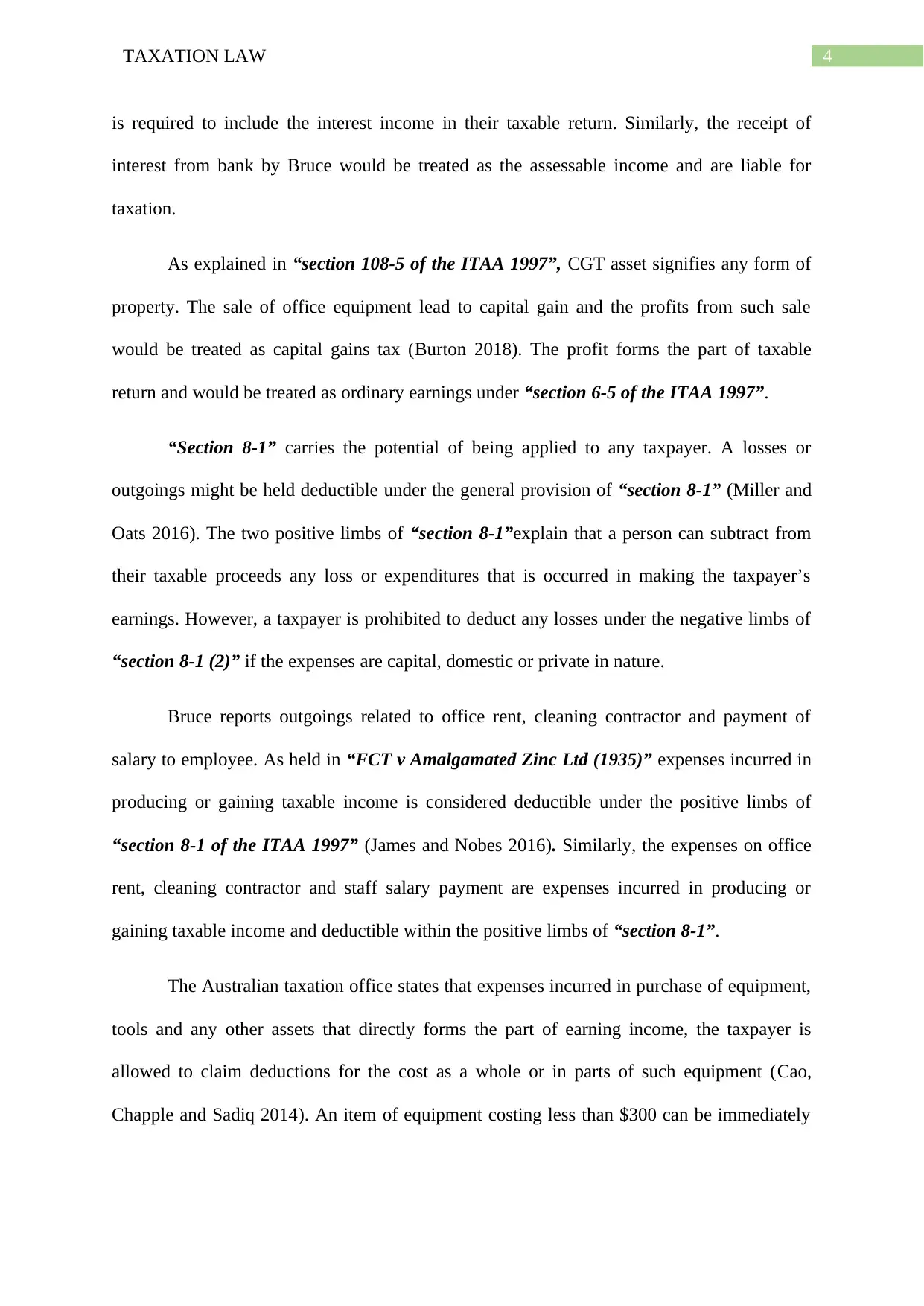
4TAXATION LAW
is required to include the interest income in their taxable return. Similarly, the receipt of
interest from bank by Bruce would be treated as the assessable income and are liable for
taxation.
As explained in “section 108-5 of the ITAA 1997”, CGT asset signifies any form of
property. The sale of office equipment lead to capital gain and the profits from such sale
would be treated as capital gains tax (Burton 2018). The profit forms the part of taxable
return and would be treated as ordinary earnings under “section 6-5 of the ITAA 1997”.
“Section 8-1” carries the potential of being applied to any taxpayer. A losses or
outgoings might be held deductible under the general provision of “section 8-1” (Miller and
Oats 2016). The two positive limbs of “section 8-1”explain that a person can subtract from
their taxable proceeds any loss or expenditures that is occurred in making the taxpayer’s
earnings. However, a taxpayer is prohibited to deduct any losses under the negative limbs of
“section 8-1 (2)” if the expenses are capital, domestic or private in nature.
Bruce reports outgoings related to office rent, cleaning contractor and payment of
salary to employee. As held in “FCT v Amalgamated Zinc Ltd (1935)” expenses incurred in
producing or gaining taxable income is considered deductible under the positive limbs of
“section 8-1 of the ITAA 1997” (James and Nobes 2016). Similarly, the expenses on office
rent, cleaning contractor and staff salary payment are expenses incurred in producing or
gaining taxable income and deductible within the positive limbs of “section 8-1”.
The Australian taxation office states that expenses incurred in purchase of equipment,
tools and any other assets that directly forms the part of earning income, the taxpayer is
allowed to claim deductions for the cost as a whole or in parts of such equipment (Cao,
Chapple and Sadiq 2014). An item of equipment costing less than $300 can be immediately
is required to include the interest income in their taxable return. Similarly, the receipt of
interest from bank by Bruce would be treated as the assessable income and are liable for
taxation.
As explained in “section 108-5 of the ITAA 1997”, CGT asset signifies any form of
property. The sale of office equipment lead to capital gain and the profits from such sale
would be treated as capital gains tax (Burton 2018). The profit forms the part of taxable
return and would be treated as ordinary earnings under “section 6-5 of the ITAA 1997”.
“Section 8-1” carries the potential of being applied to any taxpayer. A losses or
outgoings might be held deductible under the general provision of “section 8-1” (Miller and
Oats 2016). The two positive limbs of “section 8-1”explain that a person can subtract from
their taxable proceeds any loss or expenditures that is occurred in making the taxpayer’s
earnings. However, a taxpayer is prohibited to deduct any losses under the negative limbs of
“section 8-1 (2)” if the expenses are capital, domestic or private in nature.
Bruce reports outgoings related to office rent, cleaning contractor and payment of
salary to employee. As held in “FCT v Amalgamated Zinc Ltd (1935)” expenses incurred in
producing or gaining taxable income is considered deductible under the positive limbs of
“section 8-1 of the ITAA 1997” (James and Nobes 2016). Similarly, the expenses on office
rent, cleaning contractor and staff salary payment are expenses incurred in producing or
gaining taxable income and deductible within the positive limbs of “section 8-1”.
The Australian taxation office states that expenses incurred in purchase of equipment,
tools and any other assets that directly forms the part of earning income, the taxpayer is
allowed to claim deductions for the cost as a whole or in parts of such equipment (Cao,
Chapple and Sadiq 2014). An item of equipment costing less than $300 can be immediately
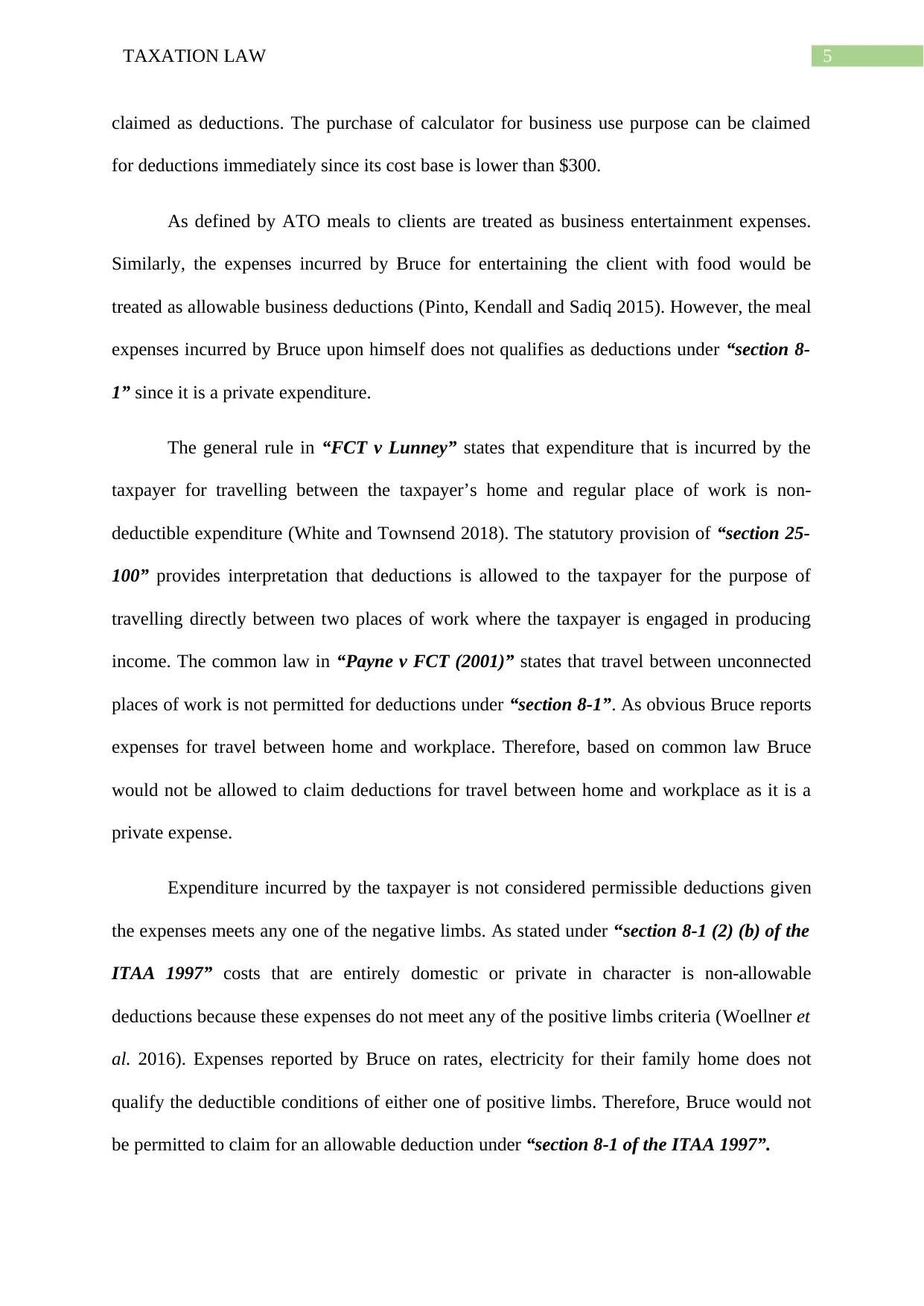
5TAXATION LAW
claimed as deductions. The purchase of calculator for business use purpose can be claimed
for deductions immediately since its cost base is lower than $300.
As defined by ATO meals to clients are treated as business entertainment expenses.
Similarly, the expenses incurred by Bruce for entertaining the client with food would be
treated as allowable business deductions (Pinto, Kendall and Sadiq 2015). However, the meal
expenses incurred by Bruce upon himself does not qualifies as deductions under “section 8-
1” since it is a private expenditure.
The general rule in “FCT v Lunney” states that expenditure that is incurred by the
taxpayer for travelling between the taxpayer’s home and regular place of work is non-
deductible expenditure (White and Townsend 2018). The statutory provision of “section 25-
100” provides interpretation that deductions is allowed to the taxpayer for the purpose of
travelling directly between two places of work where the taxpayer is engaged in producing
income. The common law in “Payne v FCT (2001)” states that travel between unconnected
places of work is not permitted for deductions under “section 8-1”. As obvious Bruce reports
expenses for travel between home and workplace. Therefore, based on common law Bruce
would not be allowed to claim deductions for travel between home and workplace as it is a
private expense.
Expenditure incurred by the taxpayer is not considered permissible deductions given
the expenses meets any one of the negative limbs. As stated under “section 8-1 (2) (b) of the
ITAA 1997” costs that are entirely domestic or private in character is non-allowable
deductions because these expenses do not meet any of the positive limbs criteria (Woellner et
al. 2016). Expenses reported by Bruce on rates, electricity for their family home does not
qualify the deductible conditions of either one of positive limbs. Therefore, Bruce would not
be permitted to claim for an allowable deduction under “section 8-1 of the ITAA 1997”.
claimed as deductions. The purchase of calculator for business use purpose can be claimed
for deductions immediately since its cost base is lower than $300.
As defined by ATO meals to clients are treated as business entertainment expenses.
Similarly, the expenses incurred by Bruce for entertaining the client with food would be
treated as allowable business deductions (Pinto, Kendall and Sadiq 2015). However, the meal
expenses incurred by Bruce upon himself does not qualifies as deductions under “section 8-
1” since it is a private expenditure.
The general rule in “FCT v Lunney” states that expenditure that is incurred by the
taxpayer for travelling between the taxpayer’s home and regular place of work is non-
deductible expenditure (White and Townsend 2018). The statutory provision of “section 25-
100” provides interpretation that deductions is allowed to the taxpayer for the purpose of
travelling directly between two places of work where the taxpayer is engaged in producing
income. The common law in “Payne v FCT (2001)” states that travel between unconnected
places of work is not permitted for deductions under “section 8-1”. As obvious Bruce reports
expenses for travel between home and workplace. Therefore, based on common law Bruce
would not be allowed to claim deductions for travel between home and workplace as it is a
private expense.
Expenditure incurred by the taxpayer is not considered permissible deductions given
the expenses meets any one of the negative limbs. As stated under “section 8-1 (2) (b) of the
ITAA 1997” costs that are entirely domestic or private in character is non-allowable
deductions because these expenses do not meet any of the positive limbs criteria (Woellner et
al. 2016). Expenses reported by Bruce on rates, electricity for their family home does not
qualify the deductible conditions of either one of positive limbs. Therefore, Bruce would not
be permitted to claim for an allowable deduction under “section 8-1 of the ITAA 1997”.
⊘ This is a preview!⊘
Do you want full access?
Subscribe today to unlock all pages.

Trusted by 1+ million students worldwide
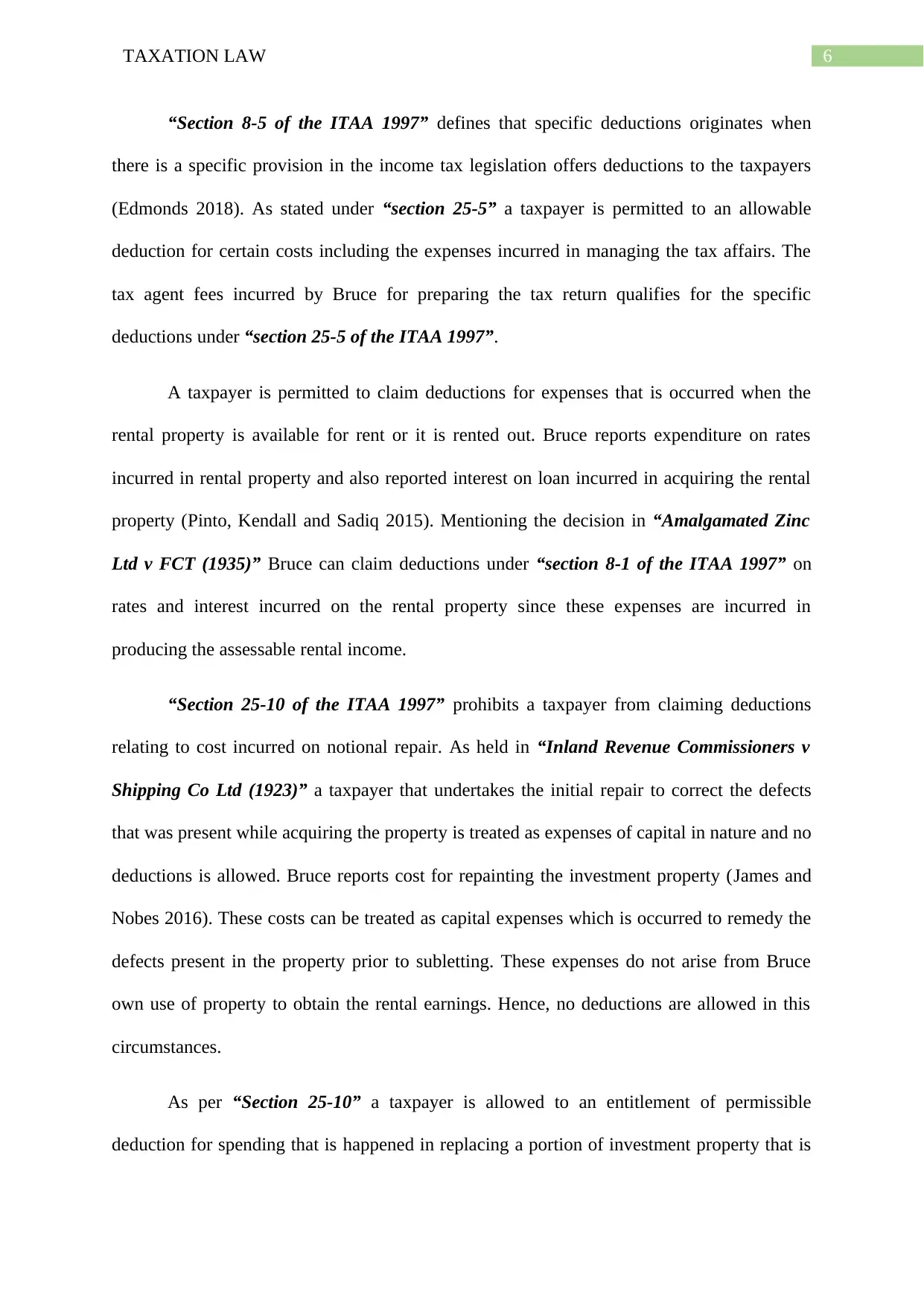
6TAXATION LAW
“Section 8-5 of the ITAA 1997” defines that specific deductions originates when
there is a specific provision in the income tax legislation offers deductions to the taxpayers
(Edmonds 2018). As stated under “section 25-5” a taxpayer is permitted to an allowable
deduction for certain costs including the expenses incurred in managing the tax affairs. The
tax agent fees incurred by Bruce for preparing the tax return qualifies for the specific
deductions under “section 25-5 of the ITAA 1997”.
A taxpayer is permitted to claim deductions for expenses that is occurred when the
rental property is available for rent or it is rented out. Bruce reports expenditure on rates
incurred in rental property and also reported interest on loan incurred in acquiring the rental
property (Pinto, Kendall and Sadiq 2015). Mentioning the decision in “Amalgamated Zinc
Ltd v FCT (1935)” Bruce can claim deductions under “section 8-1 of the ITAA 1997” on
rates and interest incurred on the rental property since these expenses are incurred in
producing the assessable rental income.
“Section 25-10 of the ITAA 1997” prohibits a taxpayer from claiming deductions
relating to cost incurred on notional repair. As held in “Inland Revenue Commissioners v
Shipping Co Ltd (1923)” a taxpayer that undertakes the initial repair to correct the defects
that was present while acquiring the property is treated as expenses of capital in nature and no
deductions is allowed. Bruce reports cost for repainting the investment property (James and
Nobes 2016). These costs can be treated as capital expenses which is occurred to remedy the
defects present in the property prior to subletting. These expenses do not arise from Bruce
own use of property to obtain the rental earnings. Hence, no deductions are allowed in this
circumstances.
As per “Section 25-10” a taxpayer is allowed to an entitlement of permissible
deduction for spending that is happened in replacing a portion of investment property that is
“Section 8-5 of the ITAA 1997” defines that specific deductions originates when
there is a specific provision in the income tax legislation offers deductions to the taxpayers
(Edmonds 2018). As stated under “section 25-5” a taxpayer is permitted to an allowable
deduction for certain costs including the expenses incurred in managing the tax affairs. The
tax agent fees incurred by Bruce for preparing the tax return qualifies for the specific
deductions under “section 25-5 of the ITAA 1997”.
A taxpayer is permitted to claim deductions for expenses that is occurred when the
rental property is available for rent or it is rented out. Bruce reports expenditure on rates
incurred in rental property and also reported interest on loan incurred in acquiring the rental
property (Pinto, Kendall and Sadiq 2015). Mentioning the decision in “Amalgamated Zinc
Ltd v FCT (1935)” Bruce can claim deductions under “section 8-1 of the ITAA 1997” on
rates and interest incurred on the rental property since these expenses are incurred in
producing the assessable rental income.
“Section 25-10 of the ITAA 1997” prohibits a taxpayer from claiming deductions
relating to cost incurred on notional repair. As held in “Inland Revenue Commissioners v
Shipping Co Ltd (1923)” a taxpayer that undertakes the initial repair to correct the defects
that was present while acquiring the property is treated as expenses of capital in nature and no
deductions is allowed. Bruce reports cost for repainting the investment property (James and
Nobes 2016). These costs can be treated as capital expenses which is occurred to remedy the
defects present in the property prior to subletting. These expenses do not arise from Bruce
own use of property to obtain the rental earnings. Hence, no deductions are allowed in this
circumstances.
As per “Section 25-10” a taxpayer is allowed to an entitlement of permissible
deduction for spending that is happened in replacing a portion of investment property that is
Paraphrase This Document
Need a fresh take? Get an instant paraphrase of this document with our AI Paraphraser
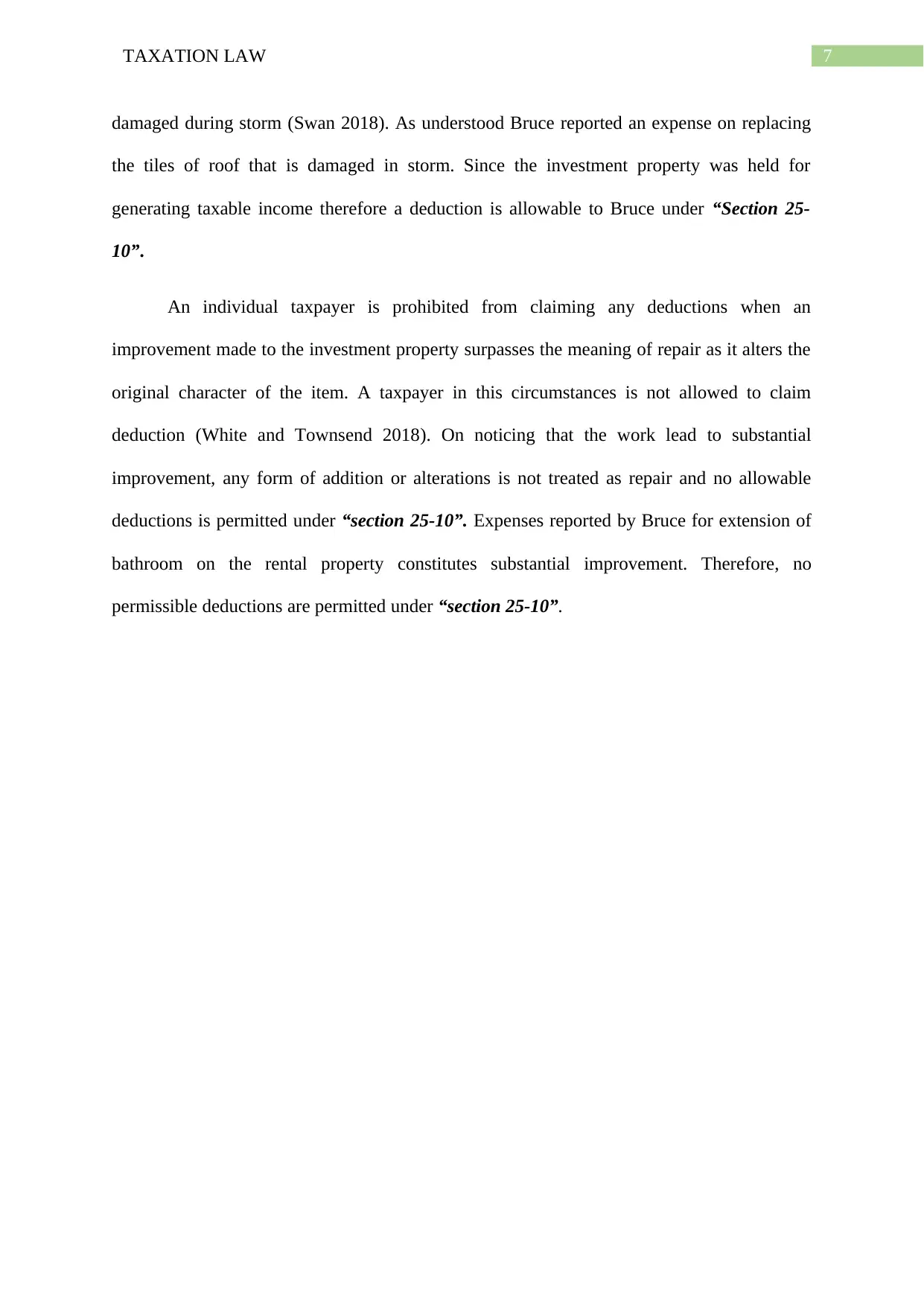
7TAXATION LAW
damaged during storm (Swan 2018). As understood Bruce reported an expense on replacing
the tiles of roof that is damaged in storm. Since the investment property was held for
generating taxable income therefore a deduction is allowable to Bruce under “Section 25-
10”.
An individual taxpayer is prohibited from claiming any deductions when an
improvement made to the investment property surpasses the meaning of repair as it alters the
original character of the item. A taxpayer in this circumstances is not allowed to claim
deduction (White and Townsend 2018). On noticing that the work lead to substantial
improvement, any form of addition or alterations is not treated as repair and no allowable
deductions is permitted under “section 25-10”. Expenses reported by Bruce for extension of
bathroom on the rental property constitutes substantial improvement. Therefore, no
permissible deductions are permitted under “section 25-10”.
damaged during storm (Swan 2018). As understood Bruce reported an expense on replacing
the tiles of roof that is damaged in storm. Since the investment property was held for
generating taxable income therefore a deduction is allowable to Bruce under “Section 25-
10”.
An individual taxpayer is prohibited from claiming any deductions when an
improvement made to the investment property surpasses the meaning of repair as it alters the
original character of the item. A taxpayer in this circumstances is not allowed to claim
deduction (White and Townsend 2018). On noticing that the work lead to substantial
improvement, any form of addition or alterations is not treated as repair and no allowable
deductions is permitted under “section 25-10”. Expenses reported by Bruce for extension of
bathroom on the rental property constitutes substantial improvement. Therefore, no
permissible deductions are permitted under “section 25-10”.
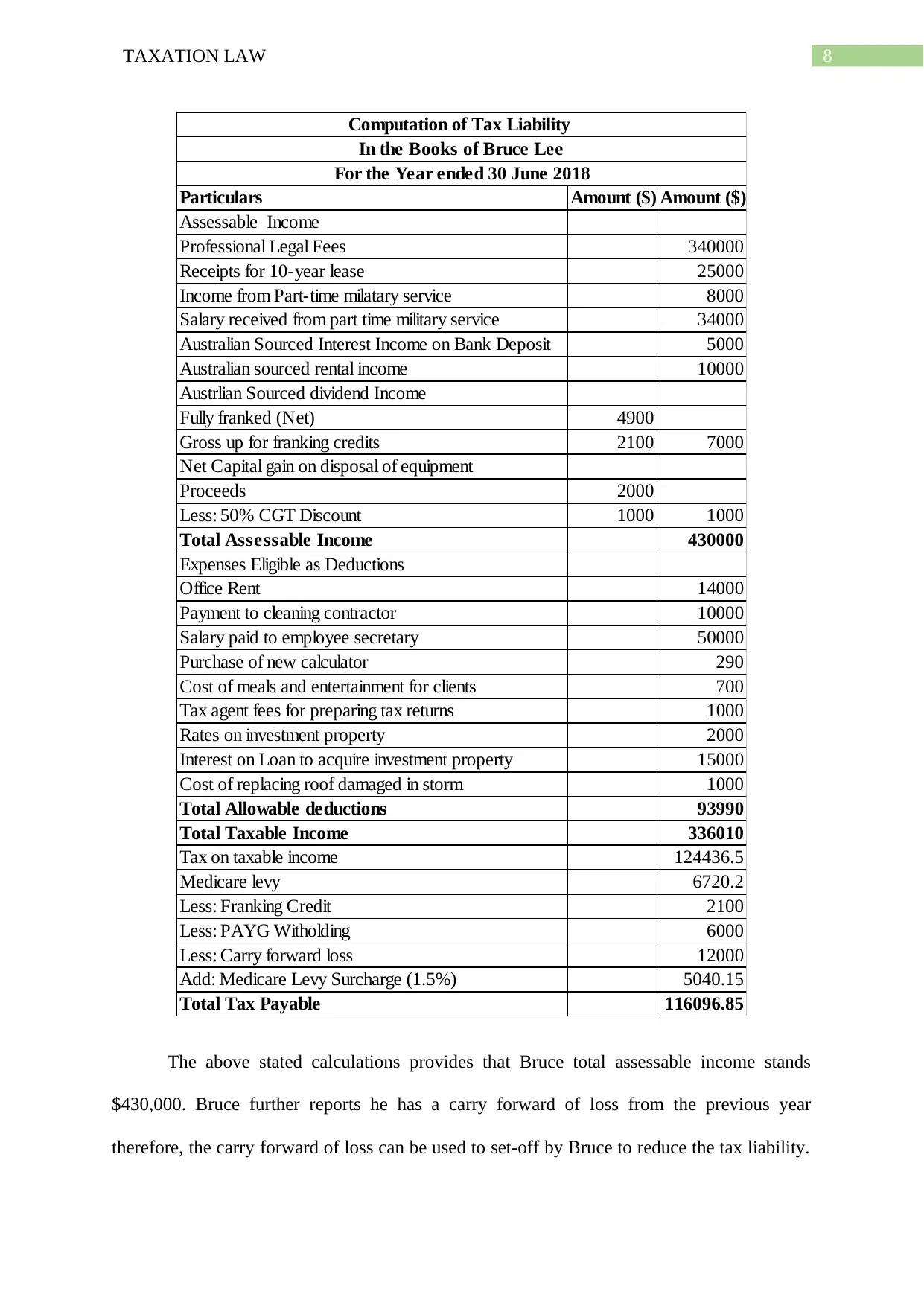
8TAXATION LAW
Particulars Amount ($) Amount ($)
Assessable Income
Professional Legal Fees 340000
Receipts for 10-year lease 25000
Income from Part-time milatary service 8000
Salary received from part time military service 34000
Australian Sourced Interest Income on Bank Deposit 5000
Australian sourced rental income 10000
Austrlian Sourced dividend Income
Fully franked (Net) 4900
Gross up for franking credits 2100 7000
Net Capital gain on disposal of equipment
Proceeds 2000
Less: 50% CGT Discount 1000 1000
Total Assessable Income 430000
Expenses Eligible as Deductions
Office Rent 14000
Payment to cleaning contractor 10000
Salary paid to employee secretary 50000
Purchase of new calculator 290
Cost of meals and entertainment for clients 700
Tax agent fees for preparing tax returns 1000
Rates on investment property 2000
Interest on Loan to acquire investment property 15000
Cost of replacing roof damaged in storm 1000
Total Allowable deductions 93990
Total Taxable Income 336010
Tax on taxable income 124436.5
Medicare levy 6720.2
Less: Franking Credit 2100
Less: PAYG Witholding 6000
Less: Carry forward loss 12000
Add: Medicare Levy Surcharge (1.5%) 5040.15
Total Tax Payable 116096.85
Computation of Tax Liability
In the Books of Bruce Lee
For the Year ended 30 June 2018
The above stated calculations provides that Bruce total assessable income stands
$430,000. Bruce further reports he has a carry forward of loss from the previous year
therefore, the carry forward of loss can be used to set-off by Bruce to reduce the tax liability.
Particulars Amount ($) Amount ($)
Assessable Income
Professional Legal Fees 340000
Receipts for 10-year lease 25000
Income from Part-time milatary service 8000
Salary received from part time military service 34000
Australian Sourced Interest Income on Bank Deposit 5000
Australian sourced rental income 10000
Austrlian Sourced dividend Income
Fully franked (Net) 4900
Gross up for franking credits 2100 7000
Net Capital gain on disposal of equipment
Proceeds 2000
Less: 50% CGT Discount 1000 1000
Total Assessable Income 430000
Expenses Eligible as Deductions
Office Rent 14000
Payment to cleaning contractor 10000
Salary paid to employee secretary 50000
Purchase of new calculator 290
Cost of meals and entertainment for clients 700
Tax agent fees for preparing tax returns 1000
Rates on investment property 2000
Interest on Loan to acquire investment property 15000
Cost of replacing roof damaged in storm 1000
Total Allowable deductions 93990
Total Taxable Income 336010
Tax on taxable income 124436.5
Medicare levy 6720.2
Less: Franking Credit 2100
Less: PAYG Witholding 6000
Less: Carry forward loss 12000
Add: Medicare Levy Surcharge (1.5%) 5040.15
Total Tax Payable 116096.85
Computation of Tax Liability
In the Books of Bruce Lee
For the Year ended 30 June 2018
The above stated calculations provides that Bruce total assessable income stands
$430,000. Bruce further reports he has a carry forward of loss from the previous year
therefore, the carry forward of loss can be used to set-off by Bruce to reduce the tax liability.
⊘ This is a preview!⊘
Do you want full access?
Subscribe today to unlock all pages.

Trusted by 1+ million students worldwide
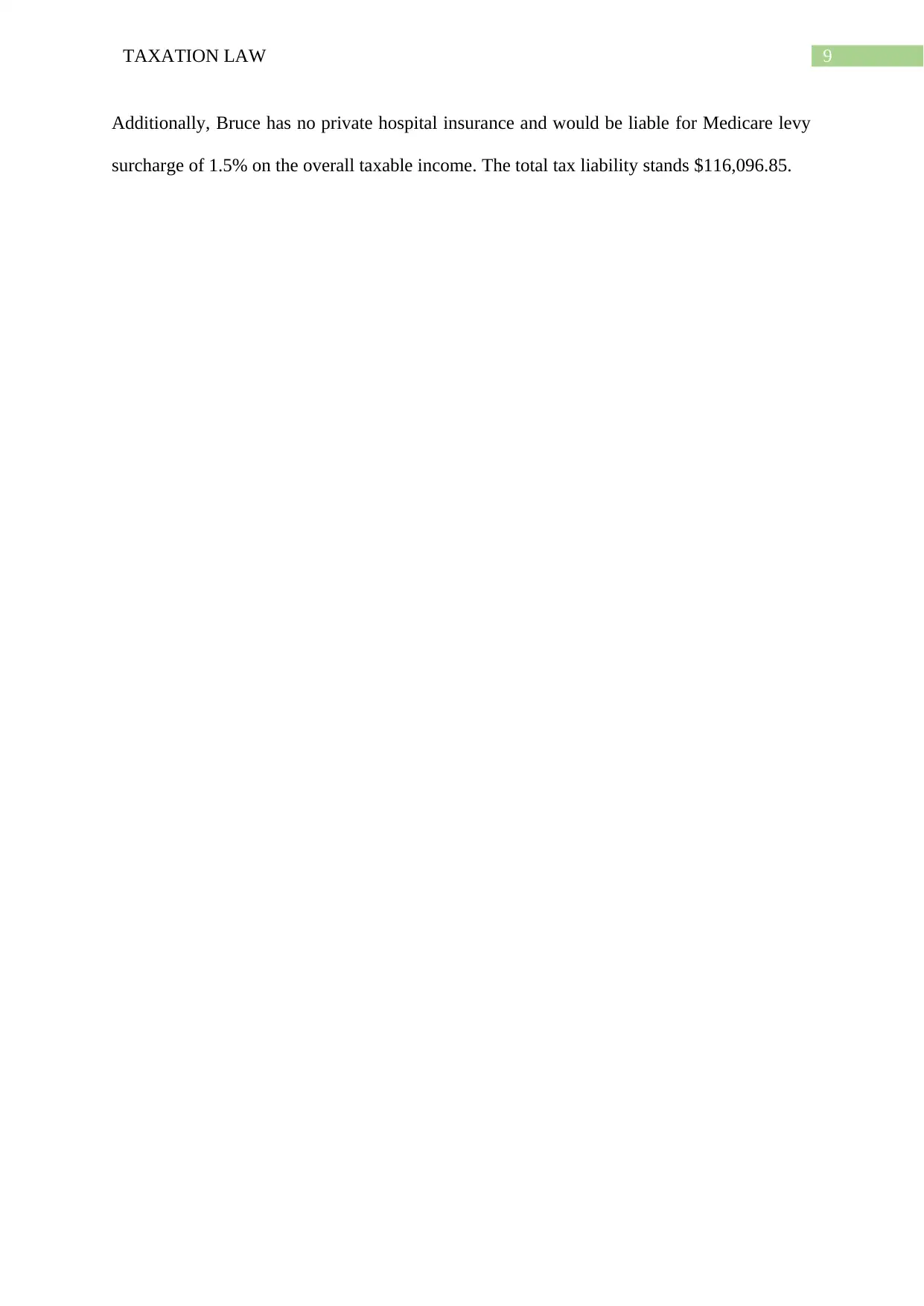
9TAXATION LAW
Additionally, Bruce has no private hospital insurance and would be liable for Medicare levy
surcharge of 1.5% on the overall taxable income. The total tax liability stands $116,096.85.
Additionally, Bruce has no private hospital insurance and would be liable for Medicare levy
surcharge of 1.5% on the overall taxable income. The total tax liability stands $116,096.85.
Paraphrase This Document
Need a fresh take? Get an instant paraphrase of this document with our AI Paraphraser
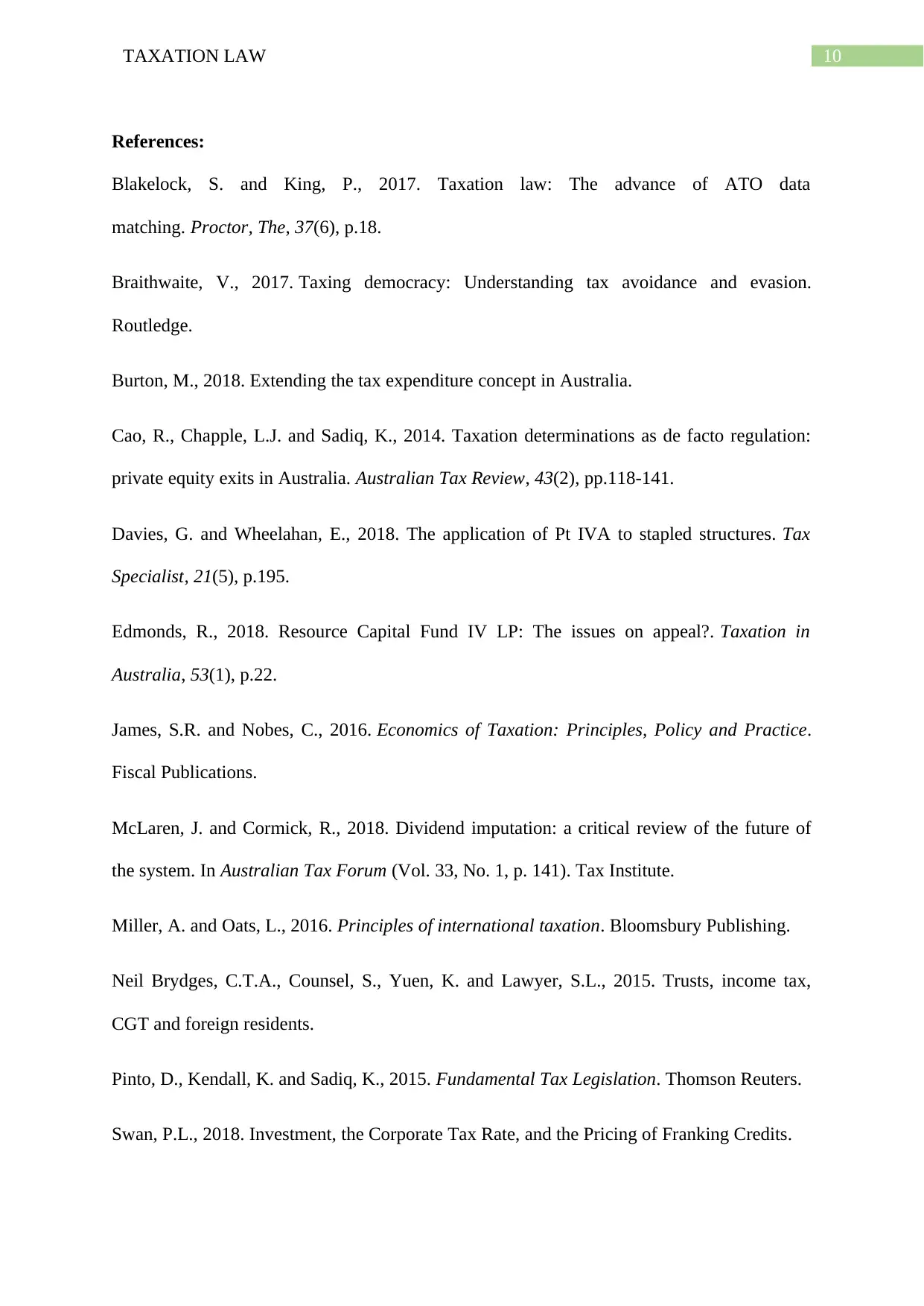
10TAXATION LAW
References:
Blakelock, S. and King, P., 2017. Taxation law: The advance of ATO data
matching. Proctor, The, 37(6), p.18.
Braithwaite, V., 2017. Taxing democracy: Understanding tax avoidance and evasion.
Routledge.
Burton, M., 2018. Extending the tax expenditure concept in Australia.
Cao, R., Chapple, L.J. and Sadiq, K., 2014. Taxation determinations as de facto regulation:
private equity exits in Australia. Australian Tax Review, 43(2), pp.118-141.
Davies, G. and Wheelahan, E., 2018. The application of Pt IVA to stapled structures. Tax
Specialist, 21(5), p.195.
Edmonds, R., 2018. Resource Capital Fund IV LP: The issues on appeal?. Taxation in
Australia, 53(1), p.22.
James, S.R. and Nobes, C., 2016. Economics of Taxation: Principles, Policy and Practice.
Fiscal Publications.
McLaren, J. and Cormick, R., 2018. Dividend imputation: a critical review of the future of
the system. In Australian Tax Forum (Vol. 33, No. 1, p. 141). Tax Institute.
Miller, A. and Oats, L., 2016. Principles of international taxation. Bloomsbury Publishing.
Neil Brydges, C.T.A., Counsel, S., Yuen, K. and Lawyer, S.L., 2015. Trusts, income tax,
CGT and foreign residents.
Pinto, D., Kendall, K. and Sadiq, K., 2015. Fundamental Tax Legislation. Thomson Reuters.
Swan, P.L., 2018. Investment, the Corporate Tax Rate, and the Pricing of Franking Credits.
References:
Blakelock, S. and King, P., 2017. Taxation law: The advance of ATO data
matching. Proctor, The, 37(6), p.18.
Braithwaite, V., 2017. Taxing democracy: Understanding tax avoidance and evasion.
Routledge.
Burton, M., 2018. Extending the tax expenditure concept in Australia.
Cao, R., Chapple, L.J. and Sadiq, K., 2014. Taxation determinations as de facto regulation:
private equity exits in Australia. Australian Tax Review, 43(2), pp.118-141.
Davies, G. and Wheelahan, E., 2018. The application of Pt IVA to stapled structures. Tax
Specialist, 21(5), p.195.
Edmonds, R., 2018. Resource Capital Fund IV LP: The issues on appeal?. Taxation in
Australia, 53(1), p.22.
James, S.R. and Nobes, C., 2016. Economics of Taxation: Principles, Policy and Practice.
Fiscal Publications.
McLaren, J. and Cormick, R., 2018. Dividend imputation: a critical review of the future of
the system. In Australian Tax Forum (Vol. 33, No. 1, p. 141). Tax Institute.
Miller, A. and Oats, L., 2016. Principles of international taxation. Bloomsbury Publishing.
Neil Brydges, C.T.A., Counsel, S., Yuen, K. and Lawyer, S.L., 2015. Trusts, income tax,
CGT and foreign residents.
Pinto, D., Kendall, K. and Sadiq, K., 2015. Fundamental Tax Legislation. Thomson Reuters.
Swan, P.L., 2018. Investment, the Corporate Tax Rate, and the Pricing of Franking Credits.
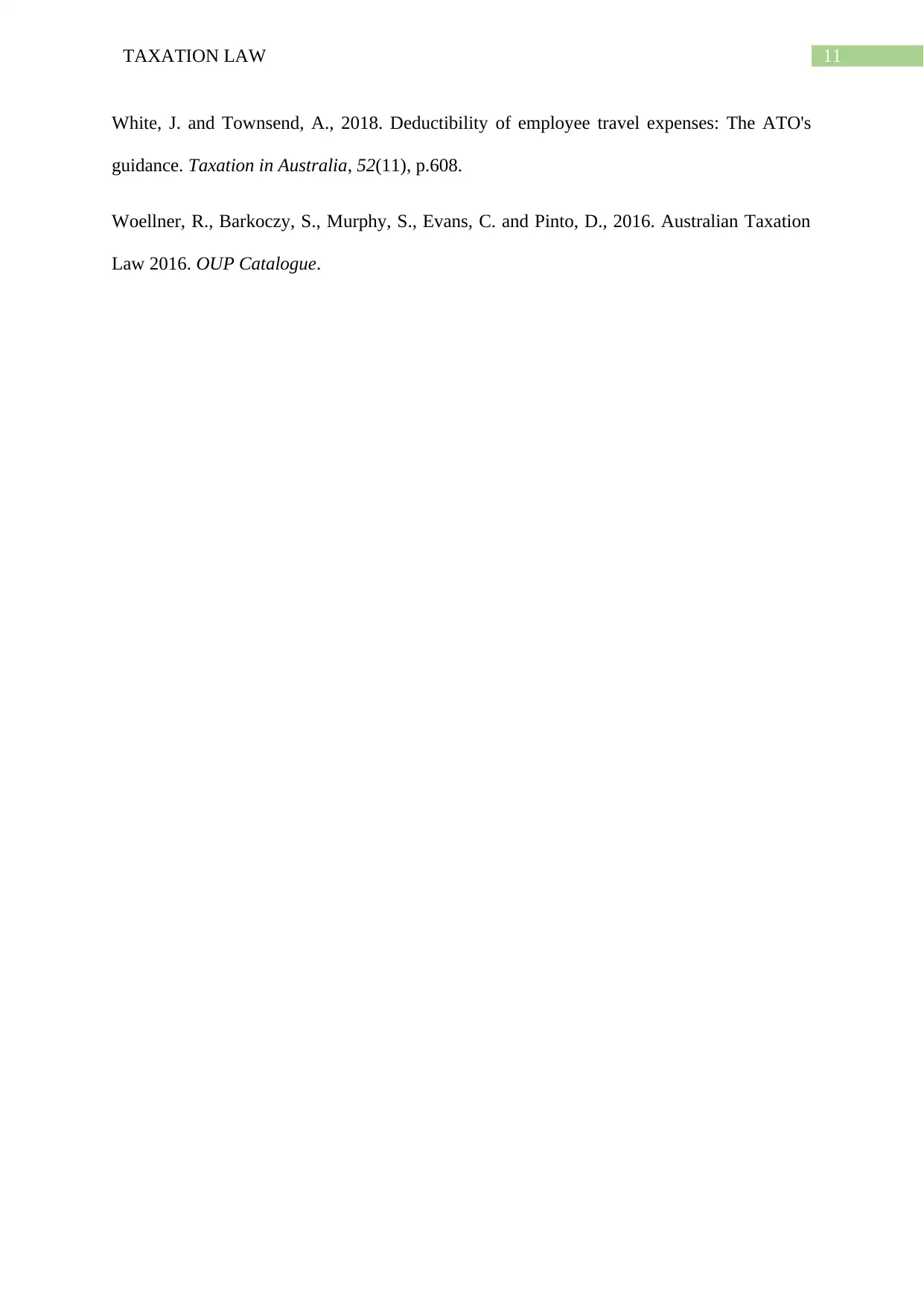
11TAXATION LAW
White, J. and Townsend, A., 2018. Deductibility of employee travel expenses: The ATO's
guidance. Taxation in Australia, 52(11), p.608.
Woellner, R., Barkoczy, S., Murphy, S., Evans, C. and Pinto, D., 2016. Australian Taxation
Law 2016. OUP Catalogue.
White, J. and Townsend, A., 2018. Deductibility of employee travel expenses: The ATO's
guidance. Taxation in Australia, 52(11), p.608.
Woellner, R., Barkoczy, S., Murphy, S., Evans, C. and Pinto, D., 2016. Australian Taxation
Law 2016. OUP Catalogue.
⊘ This is a preview!⊘
Do you want full access?
Subscribe today to unlock all pages.

Trusted by 1+ million students worldwide
1 out of 12
Related Documents
Your All-in-One AI-Powered Toolkit for Academic Success.
+13062052269
info@desklib.com
Available 24*7 on WhatsApp / Email
![[object Object]](/_next/static/media/star-bottom.7253800d.svg)
Unlock your academic potential
Copyright © 2020–2026 A2Z Services. All Rights Reserved. Developed and managed by ZUCOL.



